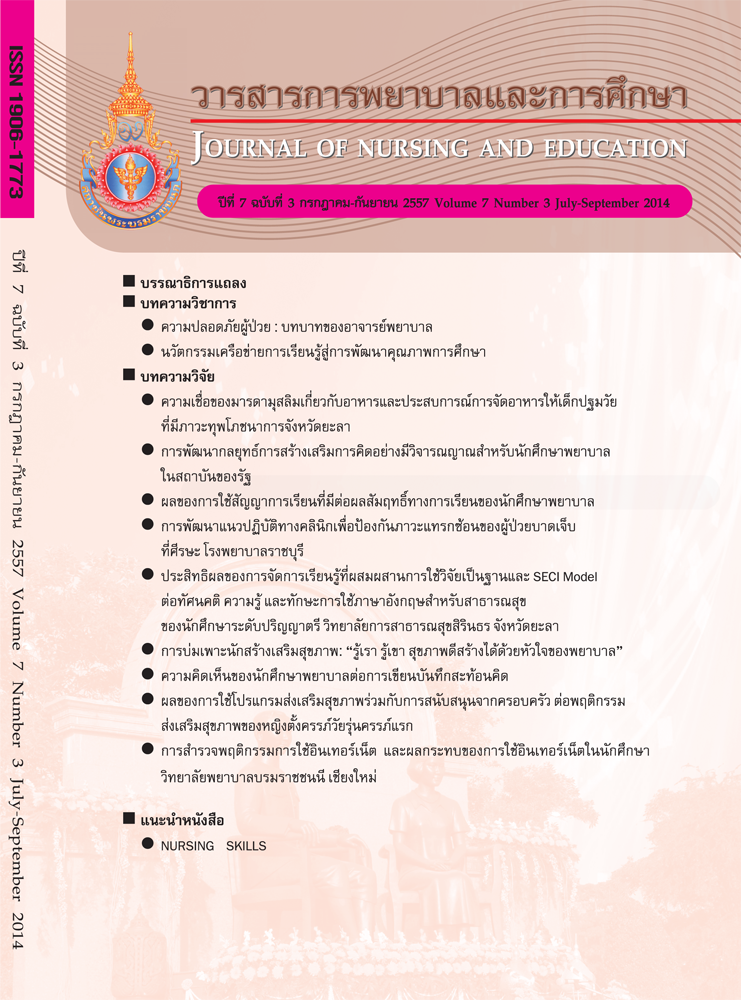การพัฒนากลยุทธ์การสร้างเสริมการคิดอย่างมีวิจารณญาณ สำหรับนักศึกษาพยาบาลในสถาบันของรัฐ
คำสำคัญ:
สกาฟโฟลดิ้ง, แผนที่ความคิด, กระบวนการพยาบาล, การคิดอย่างมีวิจารณญาณ, scaffolding, mind mapping, nursing process, critical thinkingบทคัดย่อ
บทคัดย่อการวิจัยนี้ใช้กระบวนการวิจัยและพัฒนา วัตถุประสงค์เพื่อ 1) ศึกษาสภาพและความคาดหวัง
ในการสร้างเสริมการคิดอย่างมีวิจารณญาณของนักศึกษาพยาบาล 2) สร้างและพัฒนากลยุทธ์การสร้างเสริมการคิดอย่างมีวิจารณญาณ และ 3) ศึกษาผลการทดลองใช้กลยุทธ์การสร้างเสริมการคิดอย่างมีวิจารณญาณ กลุ่มตัวอย่าง คือ อาจารย์พยาบาล ได้แก่ ผู้บริหารด้านวิชาการ 8 คน อาจารย์ 224 คน และนักศึกษาพยาบาล 366 คน เครื่องมือในการวิจัย คือ แบบสอบถาม แบบสัมภาษณ์ และแบบประเมิน การวิเคราะห์ข้อมูล
ใช้ความถี่ ร้อยละ ค่าเฉลี่ย t test percentile c2 content analysis และ SWOT analysis
ผลการศึกษา พบว่า ความคาดหวังการสร้างเสริมการคิดอย่างมีวิจารณญาณมากกว่าสภาพที่เป็นอยู่อย่างมีนัยสำคัญทางสถิติ (p<.05) กลยุทธ์การสร้างเสริมการคิดอย่างมีวิจารณญาณประกอบด้วย 4 ประเด็นกลยุทธ์ ได้แก่ 1) การบริหารจัดการเรียนการสอนที่มุ่งเน้นการคิดอย่างมีวิจารณญาณสำหรับนักศึกษาพยาบาล 2) การพัฒนาและบริหารจัดการปัจจัยที่เอื้อต่อการจัดการเรียนการสอนที่สร้างเสริมการคิดอย่างมีวิจารณญาณ 3) การพัฒนาอาจารย์ผู้สอนให้มีความสามารถในการจัดการเรียนการสอนที่สร้างเสริม
การคิดอย่างมีวิจารณญาณ และ 4) การส่งเสริมและสนับสนุนการพัฒนานักศึกษาให้เป็นผู้ที่มีการคิดอย่างมีวิจารณญาณ และผลของการใช้กลยุทธ์โดยบูรณาการกระบวนการพยาบาลกับการเรียนการสอนด้วยวิธีสกาฟโฟลดิ้งและการทำแผนที่ความคิด พบว่า การใช้กระบวนการพยาบาลในการวิเคราะห์กรณีตัวอย่าง
มีคะแนนเฉลี่ย 27.73 จาก 40 คะแนนเต็ม คะแนนความสามารถในการคิดอย่างมีวิจารณญาณของนักศึกษาหลังการทดลองกลยุทธ์สูงกว่าคะแนนก่อนทดลองอย่างมีนัยสำคัญทางสถิติ (t = 12.138 ; p-valued =.000) และความพึงพอใจของกลุ่มอาจารย์ และนักศึกษา ค่าเฉลี่ย 9.25 และ 9.15 จาก 10 คะแนนเต็มตามลำดับ
คำสำคัญ : สกาฟโฟลดิ้ง แผนที่ความคิด กระบวนการพยาบาล การคิดอย่างมีวิจารณญาณ
Abstract
The purposes of this Research & Development study were: to 1) study current situation and expectation on enhancing critical thinking for nursing students, 2) construct and develop strategies to enhance critical thinking for nursing students, 3) study the result of strategies on critical thinking skills. Subjects were 8 academic administrators, 224 nursing instructors, 366 third and fourth year nursing students. Collecting data were conducted by using questionnaire, evaluation form, interview form and SWOT analysis form. Data were analysed by frequency, percentage, mean, t test, c2, and SWOT analysis.
The research result showed that the strategies on enhancing the critical thinking skill were statistically significant higher than current situation (p<.05). Strategies to enhance critical thinking for nursing students were composed of: 1) Teaching and learning management focused on critical
thinking enhancing for nursing students, 2) Development and management contributing factors on teaching and learning for critical thinking, 3) Development teachers’ capacities for teaching nursing student to enhance critical thinking 4) Promoting and supporting nursing students to be critical thinker. Regarding strategy trial, the result of integrating nursing process with scaffolding and concept mapping techniques to enhance critical thinking for nursing students were found that the average score of nursing process was 27.73 out of 40. For critical thinking skills, the score after trial was statistically significant higher than before (p <.001). The average satisfaction score for this strategy were 9.25 (instructors group) and 9.15 (nursing students group) out of 10.
Keywords : scaffolding; mind mapping; nursing process; critical thinking






